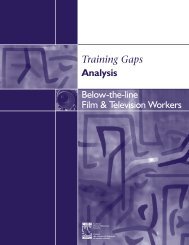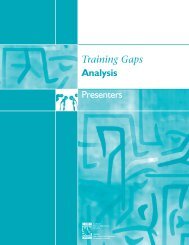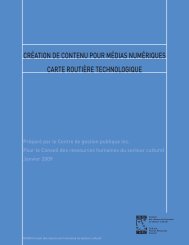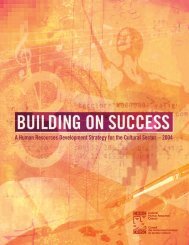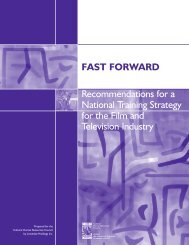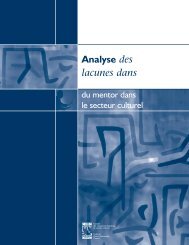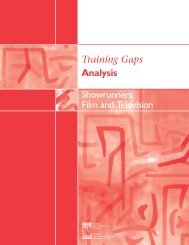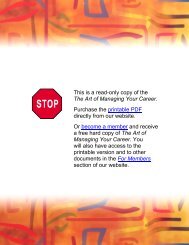Human Resources in Canada's Built Heritage Sector: Mapping the ...
Human Resources in Canada's Built Heritage Sector: Mapping the ...
Human Resources in Canada's Built Heritage Sector: Mapping the ...
- No tags were found...
You also want an ePaper? Increase the reach of your titles
YUMPU automatically turns print PDFs into web optimized ePapers that Google loves.
HUMAN RESOURCES IN CANADA’S BUILT HERITAGE SECTORArchaeologistsOverview of Occupation:• Archaeologists are employed by governments and heritage <strong>in</strong>stitutions. Many archaeologists alsohold faculty positions <strong>in</strong> colleges and universities. Some archaeologists also work <strong>in</strong> private heritageconsultancies.• When required by statute, archaeologists assess sites prior to development activities that may disturbor destroy archaeological rema<strong>in</strong>s. Where assessments warrant, subsequent field work may be undertaken.• Archaeologists also provide cultural and historical <strong>in</strong>terpretation based on artefacts.Tra<strong>in</strong><strong>in</strong>g and Education:• Archaeologists have an undergraduate or (more commonly) a post-graduate degree <strong>in</strong> archaeology.Occupational or Professional Regulation:• In B.C., though not <strong>in</strong> o<strong>the</strong>r prov<strong>in</strong>ces, <strong>the</strong> profession has a restricted title, “Registered ProfessionalConsult<strong>in</strong>g Archaeologist.” Registration is dependent on meet<strong>in</strong>g m<strong>in</strong>imum educational and experiencerequirements and accept<strong>in</strong>g a code of practice.• In o<strong>the</strong>r prov<strong>in</strong>ces, professional associations exist. These associations, however, do not have anystatutory authority.Key Skills unique to <strong>the</strong> <strong>Built</strong> <strong>Heritage</strong> <strong>Sector</strong>:• Ability to prepare or review archaeological assessments of built heritage sites.• Ability to undertake or manage archaeological field work.• Knowledge of conservation standards and techniques.• Relevant language skills.Associations or Adm<strong>in</strong>istrative Bodies concerned with Professional orOccupational Standards, Licens<strong>in</strong>g or Certification:• In B.C., <strong>the</strong> B.C. Association of Professional Consult<strong>in</strong>g Archaeologists ma<strong>in</strong>ta<strong>in</strong>s a professionalregister and confers use of <strong>the</strong> restricted title, “Registered Professional Consult<strong>in</strong>g Archaeologist”• In o<strong>the</strong>r prov<strong>in</strong>ces, <strong>the</strong>re are professional associations. However, <strong>the</strong>se associations have noregulatory function.NOC:• 4169 O<strong>the</strong>r Professional Occupations <strong>in</strong> Social Science n.e.c.Potential Issues:• All jurisdictions have legislation protect<strong>in</strong>g archaeological sites and artefacts. Typically this legislationrequires an archaeological assessment prior to major development or construction activity. It is common,although not universal, that when a review is statutorily mandated, <strong>the</strong>re are also regulation-supportedoccupational standards applicable to persons who conduct that review. In Canada, <strong>in</strong> <strong>the</strong> archaeologyfield, this applies at present only <strong>in</strong> B.C.82©CULTURAL HUMAN RESOURCES COUNCIL



